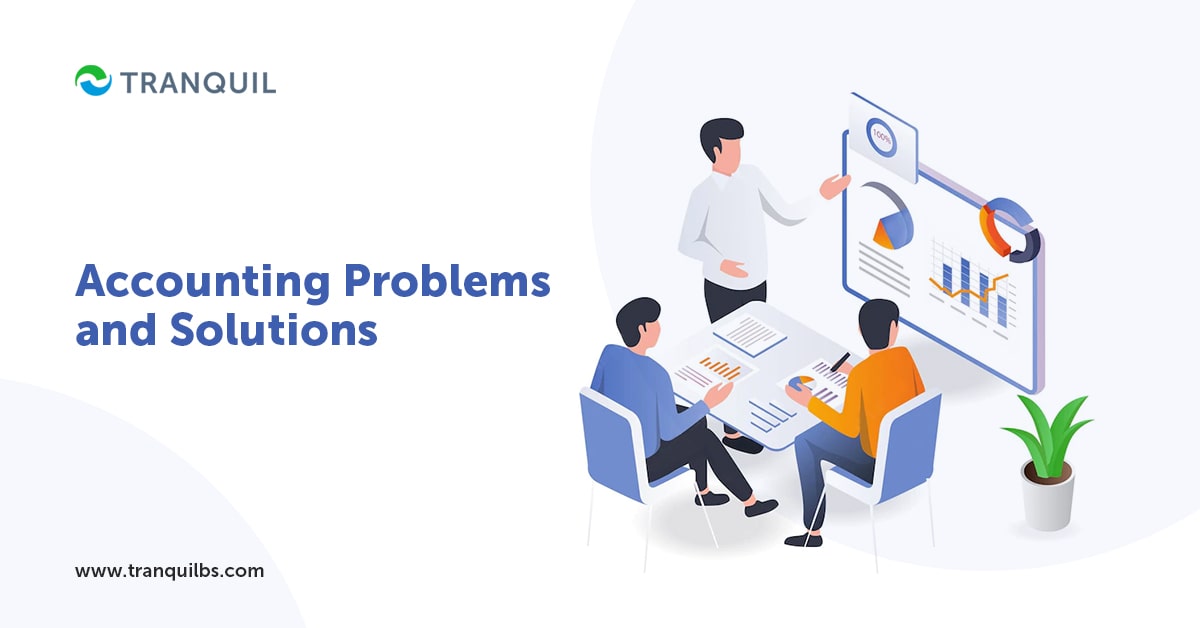
The accounting field, like most others, has undergone radical transformation today thanks to the advent of technology, and the increasing regulations governing the activity, spurred by spiraling cases of fraud and scams.
Hesitating to adopt tech or failing to comply with changing regulations can create a mountain of problems for your business.
Risk of fraud, threats to security, erroneous financial statements, and leaving your business open to fines, and other penalties for non-compliance with regulations are some of the problems you are likely to face.
The use of sophisticated software like Tranquil Accounting and Finance by trained accounting professionals can help you overcome most of the accounting challenges of the modern business world.
ALSO READ: Accounting Trends for 2023
Material errors in financial statements, fraud that happens and stays undetected because of inefficient processes and poor internal controls, improper application of standardized accounting principles, non-compliance with regulations, cybersecurity risks, and so on are the common problems that can arise in accounting.
The consequences of these issues may be serious, like impacting the cash flow negatively and give a false picture of the business profitability.
Many problems could be caused by using obsolete accounting software; other reasons include not having firm control internally, and of course, intentional fraud.
This could happen because of an insufficient number of employees or inadequate training.
ALSO READ: What is Negative Inventory and How Can you Prevent it?

One of the ways to tackle challenges in accounting is to use the right software that has the features to handle the accounting standards of the present and help you meet compliance requirements.
You should also ensure that you have the necessary number of accounting staff to handle the accounting requirements of your business and that they are properly trained on the software, your unique business accounting process, regulations, and so on.
It is also essential that the management must convey the company values, ethics, and expectations from the accounting staff, empower them with all required information, and transparent, two-way communication.
Let us look at the most common accounting problems that organizations face, and how they can be solved.
Revenue recognition problems include not applying the prescribed SCOPA standards, making duplicitous revenue schemes, not accounting for consignments correctly, using estimates that are arbitrary, and shipments of third-party inventory over and above possible usage levels.
ALSO READ: What is a Ledger in Accounting?
Implementing a robust ERP solution that can help your organization achieve the correct revenue recognition, and providing proper training to your accounting and finance teams with regard to accounting standards in your region, to maintain compliance.
While you can continue with excel worksheets, they are not as quick, efficient, or accurate as using a software system like Tranquil.

It could happen that accountants may overlook or inadvertently omit to make impairment write-downs or the requisite adjustments for noting the necessary assets or liabilities at a fair market assessment.
With changing economic and business environments, accountants need to regular check basis, if asset values have been adjusted to recognize the reduction in value, along with adjusting the fair value of specific assets and liabilities.
ALSO READ: What is Asset Depreciation and Why is it Important?
Accountants need to make necessary adjustments in the journal entries and financial statements as required by IFRS and SCOPA.
Industry experts say that it was during the COVID-19 pandemic that accounting issues suddenly increased, because of the prevalent economic conditions and backlogs in supply chains.
It is imperative that accountants are properly trained so that the correct values of assets and liabilities are recorded, adhering to SCOPA requirements; they should also mention these in the annual financial statements so that there is no risk of non-compliance.
ALSO READ: Importance of Cash Book in Accounting
Manual calculation of payroll, benefits, deductions, taxes, etc. can lead to several errors.
When paychecks are not calculated correctly, especially if you end up paying employees lesser than what is truly due to them, it can impact the morale and productivity of employees negatively.
You can outsource your payroll to an experienced third-party service provider, or implement a robust accounting software like Tranquil.
It can help you record the correct number of billable hours logged, and calculate the correct wage due to each employee.
You will also be able to comply with tax regulations as the software will compute the tax owed precisely.
You can generate reports as per categories you set – department wise, designation-wise, taxes deducted etc.
It also ensures that you remit taxes on time.
ALSO READ: Debit Notes vs Credit Notes
There could be classification errors in the cash flow statement, like improper classification to the activity type for interests and dividends both paid and received.
Interests and dividends received are operating activities while dividends paid are classified as financing activities.
Accounting professionals must be properly trained and stay on top of changing regulations so that they are able to prepare cash flow statements accurately.
ALSO READ: A Complete Guide to Cash Flow Analysis

Your legacy software is likely to be inefficient, without giving you data or insights in real-time; this means poor visibility into your processes like marketing and sales, and reliance on manual work and paper trails for recording business transactions.
Further, you may also find it difficult to maintain compliance with regulations.
Older systems are likely to be on-premise installations, which can be inefficient, and be more IT resource-intensive for updating and fixing of glitches on the premises.
With work situations increasingly including remote and hybrid employees, these systems are no longer suitable.
ALSO READ: What Do You Mean by Bank Reconciliation?
Implement modern, cloud-based, scalable ERP systems with feature-rich accounting modules, which will help you attain the following:
Without the right analysis and ideal accounting systems, accounting teams may take up precious time in mundane activities like a book closing, having no time for more important work that could add value.
By performing financial analysis, you can calculate ratios, identify and handle emerging trends, and facilitate informed decision-making for upcoming opportunities.
ALSO READ: Job Costing – Everything You Wanted to Know About
Implementing robust, cloud-based ERP like Tranquil which automates and streamlines your accounting processes and performs financial analysis will help in overcoming these deficits.
You can get dashboards that display real-time updates of your key metrics, like trend analysis; you can augment this with data visualization software for data analytics or use the inbuilt analytics in Tranquil ERP to generate automated reports for your company data.
As a small business, you may not have the manpower to enable the allocation of separate employees for various tasks to facilitate strong internal control.
Your accounting systems might therefore be vulnerable to duplicate information recording and fraud.
ALSO READ: Everything You Need to Know About the P2P (Procure to Pay) Cycle
Where it’s not possible to separate duties, ideally the business owner must be involved in approving, in the form of a reviewer of vendor invoices, and also a second signatory.
Finance and accounting teams requires adequate human resources and software to be able to execute their duties effectively and achieve the desired results.
Unfortunately, sometimes, they do not get the resources they require.

This includes assets recorded in the balance sheet, and those not yet recorded, like cash that is yet to be deposited.
Inventory must be managed properly so that there is controlled access for receiving, storage, custody, and so on, and it must be verified against book records via physical counting.
This also applies to office equipment like furniture, computers, printers, etc.; they must be tagged and counted and tested for possible loss in value that may necessitate a write down.
If there are any discrepancies in fixed asset balance, it could be because the physical count was erroneous.
A cutoff date must be established to record purchases of fixed assets.
If you notice any unrecorded assets, record them immediately by looking up the purchase invoice; in case of the non-counting of an asset, you need to verify if it was disposed of.
The difference between the book value of fixed assets with accumulated depreciation and sale value should be recorded correctly, noting the loss or gain in the sale; if any fixed assets are missing, they should be written off.
ALSO READ: How Does Landed Cost Affect the Cost of Inventory?
Improper internal control, employees colluding with one another to embezzle company finances, manipulation of accounts – these are unfortunately not so uncommon occurrences.
By implementing modern, secure, and cloud-based ERP that automates your business processes, you can easily catch errors and frauds and nip them in the bud.
Variance analysis can help you investigate the causes for differences between budgeted expenses and actuals.
By carrying out a three-way document verification, analysis of vendor master files, and validating vendor authenticity, you can further strengthen control and minimize risk of fraud.
Always try to segregate duties and tasks of employees: for example, recording transactions, and controlling assets must not be assigned to the same employee.
From data privacy, and security to taxation and sanction lists, there are a number of regulations that every organization has to comply with in each country they operate in.
Non-compliance with regulations can result in huge fines and imprisonment and can spoil your reputation, hitting your business hard.
Your employees, especially accountants and Finance professionals, must be well-versed with regulations that apply to your company and industry.
Make sure they are trained and familiarized with regulations, as well as company values, goals, and ethics.
They should be made to feel that they are also responsible to uphold the image of the company in public.
Again, the right software will also help.
ALSO READ: What are Backorders?

Many of your accounting problems can be resolved, and your accounting processes be made more efficient by implementing the right automation software like Tranquil.
Automation delivers a range of benefits to businesses like ensuring compliance, increasing accuracy, saving time and resources, quicker invoice processing, ensuring timely receipt and payments on accounts, accurate payroll calculation, deciding on discounts to be offered, improved forecasts, enhanced cash flow management, helping deliver better customer service, and the like.
With cloud-based ERP solutions, you can also choose subscription billing so that you pay only for what you use.
ALSO READ: Detailed Guide on ERP in Production Planning
Tranquil Cloud ERP has a robust Finance and Accounting module that helps you do all of this and more, at a budget-friendly price. Do schedule a demo at your convenient time to see how Tranquil can help you resolve or avoid the most commonly encountered accounting problems. We will be happy to answer all your queries.